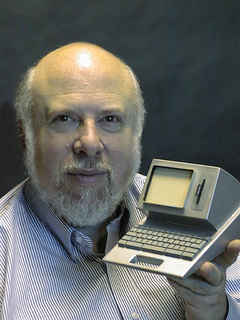A Quote by Jef Raskin
I am confident that we can do better than GUIs because the basic problem with them (and with the Linux and Unix interfaces) is that they ask a human being to do things that we know experimentally humans cannot do well. The question I asked myself is, given everything we know about how the human mind works, could we design a computer and computer software so that we can work with the least confusion and greatest efficiency?
Quote Topics
Related Quotes
The world is not yet finished, but everyone is behaving as if everything was known. This is not true. In fact, the computer world as we know it is based upon one tradition that has been waddling along for the last fifty years, growing in size and ungainliness, and is essentially defining the way we do everything. My view is that today’s computer world is based on techie misunderstandings of human thought and human life. And the imposition of inappropriate structures throughout the computer is the imposition of inappropriate structures on the things we want to do in the human world.
I like to question the minutia, to get to the essence of things. The minutia of life is all about design. It's about the design of how you talk to another human being; it's the design of speech; it's the design of everything we do. We need to be better at listening, and we need to aim more directly at understanding and being understood.
When I watch TV, and TCM isn't on, I just switch channels and look at all the information about everything. The internet is perfect for that, which is why I didn't really want to get a computer in the first place. I thought, "If I have a computer and know about this whole Google thing, I am not going to be able to sit still for a second; I'm going to think about something and then have to look it up." I have never bought myself a computer or a phone, but guys in my life have bought them for me, for whatever reason. So now I have them.
The positive thing about collaborating is that I cannot get distracted by coding work, because I cannot waste the other collaborator's time in the same way as I can my own. And it's always good to learn how the other person works, learn about techniques, learn social things like: how do you communicate with another person? The music I make with other people I'm much more confident about, I'm a little bit less judgemental of the outcome than with my own stuff because I know it's not only me, it's a more outside of me. Sometimes I even like them better than my own tracks.
As to the human race. There are many pretty and winning things about the human race. It is perhaps the poorest of all the inventions of all the gods but it has never suspected it once. There is nothing prettier than its naive and complacent appreciation of itself. It comes out frankly and proclaims without bashfulness or any sign of a blush that it is the noblest work of God. It has had a billion opportunities to know better, but all signs fail with this ass. I could say harsh things about it but I cannot bring myself to do it-it is like hitting a child.
Always it is thus with my new students, and especially with the human ones; the mind is the last muscle they train or use, and the one that they regard the least. Ask them about swordplay and they can list every blow from a duel a month old, but ask them to solve a problem or make a coherent statement and... well, I would be lucky to get more than a blank stare in return.




































